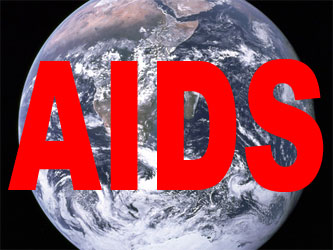AIDS will block Millennium Development Goals for some counties
AIDS will block Millennium Development Goals for some counties
Public Library of Science news release
November 27, 2006
HIV/AIDS will make it difficult, if not impossible, for many countries to reach the 2015 Millennium Development Goals (MDGs), according to a new analysis by researchers published to coincide with World AIDS Day on December 1, 2006.
In September 2000, 189 governments committed to achieving eight development goals to improve living standards worldwide. But according to the analysis in PLoS Medicine, by Robert Hecht and colleagues at the International AIDS Vaccine Initiative and EASE International, the HIV/AIDS epidemic will stall progress toward reaching at least five of these goals: halving extreme poverty and hunger; reducing childhood deaths; achieving universal primary education; improving maternal health; and tackling infectious diseases, such as TB and malaria.
The researchers examined studies that have investigated how HIV/AIDS impedes human development and found that HIV/AIDS:
- Typically lowers national GDP by up to 1.5% annually with an even greater impact on economic development in Africa. A study of 80 developing countries found that in a hypothetical African country with 1 in 5 people infected with HIV, the rate of GDP growth would be 2.6% lower each year than it would have been in the absence of AIDS.
- Worsens childhood nutritional status — The effects of food crises are greater in areas with high HIV prevalence. In addition, children whose parents have died from AIDS are less likely to receive adequate nutrition.
- Compromises efforts to educate children — Children orphaned by HIV are less likely to enroll in school. In addition, high HIV prevalence is linked to teacher absenteeism and mortality.
- Contributes to childhood and maternal mortality — Women infected with HIV are more likely to experience birth complications, such as bleeding and sepsis, which are potentially deadly.
- Undermines efforts to tackle TB and malaria — People infected with HIV are less able to mount an immune response if they become co-infected with malaria or TB.

By 2030 AIDS could be leading global cause of illness HIV/AIDS, depression, and ischemic heart disease could be leading causes of illness by 2030 say researchers from the World Health Organization in a new paper published in the journal PLoS Medicine. However the researchers project that fewer children under the age of 5 years will die from disease in coming decades. |
“Failure to halt and reverse the AIDS epidemic will continue to jeopardize progress toward achieving a wide range of the MDGs,” conclude Hecht and colleagues.
“From now until the 2015 MDG target date, it is essential that the delivery of existing interventions for prevention, treatment, and mitigation of the social effects of HIV be dramatically increased. At the same time, it is essential to invest in the development of the new and better technologies needed for more effective prevention, diagnosis and treatment of HIV/AIDS.”
Citation: Hecht R, Alban A, Taylor K, Post S, Andersen NB, et al. (2006) Putting it together: AIDS and the Millennium Development Goals. PLoS Med 3(11): e455.
This is a modified news release from the Public Library of Science .













